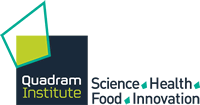Dr L Hall
No more applications being accepted
Competition Funded PhD Project (European/UK Students Only)
About the Project
We are looking for a creative and enthusiastic PhD candidate to join a dynamic, multi-disciplinary research team investigating the interactions of the host with the intestinal microbiota during the early life developmental window. The Hall lab has 3 main research themes including, microbe-diet interactions, microbe-host cross-talk, and colonisation resistance. For more details visit www.halllab.co.uk.
This Hall lab is based within the Quadram Institute, a new interdisciplinary microbiome and food research Institute (www.quadram.ac.uk), thus providing an excellent platform for a starting scientific career.
Background: Our bodies are home to complex microbial communities, termed the microbiota, which are fundamental for host health. During the first stages of life our microbiota is dominated by the microbiota genus Bifidobacterium, and high levels of this pioneering microbe is commonly associated with improved infant wellbeing. Previous work in the Hall lab has suggested that specific components expressed by bifidobacteria may act as additional nutrient sources for community re-structuring and that metabolites produced positively influence immune cell maturation.
The goal of this PhD studentship is to use biochemistry, microbiology and bioinformatic techniques, in combination with immune cell analysis, to identify mechanisms underlying bifidobacterial metabolite cross-talk with the wider microbiota and the host. This project also involves close collaboration with other research groups on the Norwich Research Park; Prof Field (John Innes Centre) and Prof Murrell (University of East Anglia) and Dr Korcsmaros (Earlham Institute).
This project has been shortlisted for funding by the Norwich Biosciences Doctoral Training Partnership (NRPDTP). Shortlisted applicants will be interviewed as part of the studentship competition. Candidates will be interviewed on either the 8th, 9th or 10th January 2019.
The NRP DTP offers postgraduates the opportunity to undertake a 4-year research project whilst enhancing professional development and research skills through a comprehensive training programme. You will join a vibrant community of world-leading researchers. All NRPDTP students undertake a three-month professional internship (PIPS) during their study. The internship offers exciting and invaluable work experience designed to enhance professional development. Full support and advice will be provided by our Professional Internship team. Students with, or expecting to attain, at least an upper second-class honours degree, or equivalent, are invited to apply.
For further information and to apply, please visit our website: www.biodtp.norwichresearchpark.ac.uk
Funding Notes
For funding eligibility guidance, please visit our website: http://biodtp.norwichresearchpark.ac.uk/how-to-apply/funding-and-eligibility. Full Studentships cover a stipend (UKRI rate: £14,777pa – 2018/9), research costs and tuition fees at UK/EU rate and are available to UK and EU students who meet the UK residency requirements.
Students from EU countries who do not meet the UK residency requirements may be eligible for a fees-only award. Students in receipt of a fees-only award will be eligible for a maintenance stipend awarded by the NRPDTP Bioscience Doctoral Scholarships. To be eligible students must meet the EU residency requirements.

 Continue with Facebook
Continue with Facebook

